|
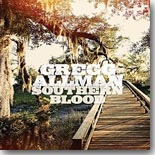
It’s
not often that a musician gets to write his
final chapter, but Gregg Allman got the
opportunity and made the most of it with
Southern Blood (Rounder Records). When Allman
and producer Don Was began working, Allman had
already undergone liver transplant surgery, but
the cancer had returned. The two carefully chose
songs for the album and Allman invited his
working band, plus a few musical associates, to
FAME Studios in Muscle Shoals, which is where
Allman’s brother, Duane got his start recording
for Stax and where the Allman Brothers Band did
their first recordings (as Hour Glass).
The song selection is nearly perfect. The blues
are well represented with a dynamite cover of
the Muddy Waters/Willie Dixon standard “I Love
The Life I Live,” an obvious reference to the
way Allman lived his own life, and a lovely
reading of a soul classic which was crafted
originally by Percy Sledge in Muscle Shoals.
Allman’s performance on “Out of Left Field,”
backed by wonderful McClary Sisters vocals and a
terrific horn section, is one of his finest,
dripping with soul and heart.
When Johnny Jenkins originally recorded “Blind
Bats and Swamp Rats” in 1970 at Muscle Shoals,
Allman was the only member of the Allman
Brothers Band who didn’t participate, but he
covers it here and does a fine job. Allman’s
guitarist Scott Sharrard wrote the rowdy
southern rocker “Love Like Kerosene,” which in Allman’s capable hands sounds like it would have
been a perfect fit on an Allman Brothers set
list, and on Lowell George’s “Willin’” is given
an excellent treatment as well.
Near the beginning of the disc is a powerful set
of cover songs that reflect strongly on Allman’s
sense that his time is near. Tim Buckley’s
somber “Once I Was,” followed by Bob Dylan’s
“Going Going Gone,” where it seems Allman has
accepted the reality completely. The reflective
“Black Muddy River,” a latter-day Grateful Dead
tune, and a tune that Allman was somewhat
skeptical about recording, actually works really
well.
As uniformly fine as this album is, the
beginning and concluding songs are the most
memorable. The only Gregg Allman original
(co-written by Sharrard), “My Only True Friend,”
ranks with his greatest compositions. If you can
listen to Allman state, “I hope you’re haunted
by the music of my soul, when I’m gone,” and not
get choked up, you have ice water in your veins
(I got choked up typing it).
The closer is Jackson Browne’s “Song For Adam.”
Browne was an early songwriting partner of
Allman’s, during his days spent on the West
Coast. While this is one of Browne’s finest
works (he sings background vocals here), written
for a lost friend, it’s obvious that Allman is
singing about his brother, Duane. Duane’s sudden
and premature death forever affected his younger
brother’s life, and Gregg got so emotional while
singing it that he was unable to complete the
last two lines.
Allman passed away in late May and one of the
last things he did before his death was listen
to the final masters of Southern Blood. With his
death, music fans lost one of the finest voices
in blues, soul, and rock, but with this
fantastic closing statement, it’s clear that he
went out on his own terms and he finished
strong.
--- Graham Clarke
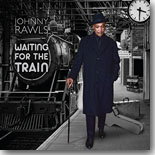 On
Waiting For
The Train (Catfood Records), Johnny Rawls looks
at topics both physical and spiritual. Backed by
one of the finest soul/blues bands currently
practicing, The Rays, Rawls offers up a
typically strong set of tunes, six originals and
four covers, all steeped in a style that pays
reverence to the soul music of yesterday, but
also appeals to newer listeners just as much.
Rawls has been doing this so long and so well
that it’s easy to take him for granted, but one
should never, ever do that. On
Waiting For
The Train (Catfood Records), Johnny Rawls looks
at topics both physical and spiritual. Backed by
one of the finest soul/blues bands currently
practicing, The Rays, Rawls offers up a
typically strong set of tunes, six originals and
four covers, all steeped in a style that pays
reverence to the soul music of yesterday, but
also appeals to newer listeners just as much.
Rawls has been doing this so long and so well
that it’s easy to take him for granted, but one
should never, ever do that.
Catfood Records chief (and Rays bass player) Bob
Trenchard collaborates with Rawls on all of the
originals, and the first three focus on the
gospel side of the blues. The opener, “Rain
Keeps Fallin’,” is a horn-driven rocker that
finds Rawls imploring the rain to wash away his
sins and release him from his tribulations,
while the slick Memphis soul of “Las Vegas”
(penned by Trenchard and James Armstrong)
includes a powerful warning not to miss out on
salvation. The title track is a slow ballad, but
the train referred to is the train taking
passengers to their eternal destination.
Rawls always includes a cover of a classic
’60s
soul tune on his releases and this disc is no
exception. Bobby Womack’s “I’m In Love”
(popularized by Wilson Pickett) gets a marvelous
treatment with lovely background harmonies
(Janelle Thompson and Shakara Weston) and those
wonderful Rays horns (Andy Roman – tenor and
alto sax, Mike Middleton – trumpet, Nick Flood –
baritone and tenor sax, Joel Chavarria –
trombone) and a crisp guitar solo from Johnny
McGhee.
“California Shake” moves things to the secular
side with an irresistible funky rhythm (nice
work from Trenchard on bass and drummer Richy
Puga) and risqué subject matter. “Blackjack Was
A Gambler” is a story song with vivid imagery
and a moral, and Rawls does a masterful job on
Bob Dylan’s “I Shall Be Released,” with a
measured and soulful vocal. Tyrone Davis’
“Turning Point” has been covered a multitude of
times --- maybe too many times --- but Rawls’
version is one of the best that I’ve heard,. His brisk read on Syl Johnson’s classic Hi side
“We Did It,” is even better.
With the closer, the subtle R&B love ballad
“Stay With Me” (penned by Rawls, Trenchard, and
Linda Francis), Waiting For The Train clocks in
at just over 40 minutes. While this may be on
the short side for some, that’s what the
“Replay” button is for, and it’s safe to say
that soul/blues fans will replaying Johnny
Rawls’ latest many times.
--- Graham Clarke
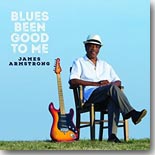 After an 11-year hiatus from recording in the
early 2000s, James Armstrong is practically
prolific these days, which is good news for
blues fans. His latest release, Blues Been Good
To Me is his third since 2011, all on Catfood
Records. For his latest effort, Armstrong offers
seven brand new songs, two covers, and a new
version of an old favorite. Armstrong’s silky
smooth vocals are as fine as ever, and his
guitar skills are as sharp as they were prior to
his 1995 injury, which caused permanent damage
to his left hand. He’s added slide guitar to his
repertoire in recent years and has become a
splendid slide guitarist in the process. After an 11-year hiatus from recording in the
early 2000s, James Armstrong is practically
prolific these days, which is good news for
blues fans. His latest release, Blues Been Good
To Me is his third since 2011, all on Catfood
Records. For his latest effort, Armstrong offers
seven brand new songs, two covers, and a new
version of an old favorite. Armstrong’s silky
smooth vocals are as fine as ever, and his
guitar skills are as sharp as they were prior to
his 1995 injury, which caused permanent damage
to his left hand. He’s added slide guitar to his
repertoire in recent years and has become a
splendid slide guitarist in the process.
Armstrong is one of the finest songwriters
currently practicing in the blues and he’s at
the top of his game on Blues Been Good To Me.
The autobiographical title track kicks off the
disc, with Armstrong reflecting on his travels,
fans, and his legacy, while “Second Time Around”
tells the tale of a young woman who’s hesitant
about jumping into another romance (the “Secret
Agent Man” guitar riff is pretty cool here,
too).
“Early Grave” is an aching slow blues
dealing with a woman stepping out on her man,
and “Old Man In The Morning (Young Man At
Night)” will certainly have middle-aged blues
fans nodding in agreement.
“Change In The Weather” is another excellent
somber slow ballad about heartbreak; few do
these as well as James Armstrong. “Ain’t Another
Love Song” is a cool ballad that finds the
singer finally putting his love for a woman into
words, and “Shot Gun Wedding” is a sober tale of
a relationship “doomed from the start.”
Armstrong also reprises the title track from his
debut release in 1995, “Sleeping With A
Stranger,” one of his most popular songs.
On his recent releases, Armstrong has been
including unique interpretations of familiar
tunes from other musical genres. This time
around, he covers Robert Palmer’s “Addicted To
Love,” transforming it into a funky soul blues,
and the Marvin Gaye Motown classic, “How Sweet
It Is To Be Loved By You,” remaking it into a
country-flavored romp. Both readings work really
well.
Label mate Johnny Rawls serves as co-producer
with Armstrong (with Jim Gaines as associate
producer), and rhythm guitarist Johnny McGhee is
also on board. Others contributors include Matt
Murdick (keyboards), Andrew Blaze Thomas
(drums), and Darryl Wright (bass), who’s worked
with Mavis Staples. Brother John Kattke’s B3 is
prominent throughout and the horn section (Bryan
Fritz, Corey Fritz, and Kasimu Taylor) do a fine
job as well.
To these ears, Blues Been Good To Me, is James
Armstrong’s best release since he returned to
the studio six years ago. It’s a perfect mix of
blues and soul from one of the best.
--- Graham Clarke
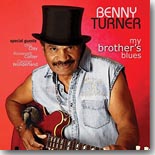 Though
Benny Turner has been a musician for over
60 years, he worked in the background for many
years, playing guitar or bass with various
gospel groups (including a ground-breaking
tenure with the Soul Stirrers), R&B singer Dee
Clark, and various Chicago blues bands,
recording with some of them in addition to
releasing some of his own recordings. He also
enjoyed a couple of stints with his brother,
Freddie King. Though
Benny Turner has been a musician for over
60 years, he worked in the background for many
years, playing guitar or bass with various
gospel groups (including a ground-breaking
tenure with the Soul Stirrers), R&B singer Dee
Clark, and various Chicago blues bands,
recording with some of them in addition to
releasing some of his own recordings. He also
enjoyed a couple of stints with his brother,
Freddie King.
After his brother’s death in 1976, Turner left
music for a couple of years before rejoining
Mighty Joe Young. After Young was forced to stop
touring due to health reasons, Turner moved to
New Orleans to serve as Marva Wright’s
bandleader until she passed away in 2010. Turner
has been very busy in recent years as a solo
artist, having released several well-received
albums, including 2016’s When She’s Gone. He
recently released his autobiography, Survivor:
The Benny Turner Story (co-written with Bill
Dahl), which has also garnered great reviews.
Turner also recently released
My Brother’s Blues
(Nola Blues Records), an outstanding 11-song set
of tunes made famous by his late brother. While
all of these songs will be familiar to Freddie King
fans, Turner puts his own distinctive touches on
each track, notably a fine horn section that
appears on several tracks and the swirling
keyboards that give a couple of songs a New
Orleans feel. Vocally, he sounds a bit like his
brother, but his voice is a bit smoother and on
the soulful side of the blues.
“I’m Tore Down” also includes co-lead vocals
from Wright and the late Otis Clay from a long
ago session, and guitarist/vocalist Carolyn
Wonderland also appears on a pair of songs,
contributing slide guitar on “Mojo Boogie” and
singing background vocals (with Kathy Murray) on
“Wee Baby Blues,” and Sacred Steel guitarist
Roosevelt Collier add some wicked lap steel
guitar to “I’m Ready.” Turner himself picks up
lead guitar on “Wee Baby Blues” and “ See See
Baby,” his crisp style sounding a lot like his
brother’s playing.
Turner’s My Brother’s Blues is a warm and loving
look at his big brother’s music. Even though
it’s taken him awhile to receive the recognition
he deserves as a blues man, Benny Turner is
making up for lost time these days. Blues fans
are advised to do the same thing in checking out
his music. This is a great introduction to Benny
Turner, and a great reminder of the powerful
music that Freddie King left us.
--- Graham Clarke
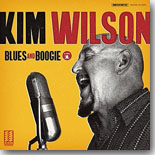 Blues and Boogie, Vol. 1 (Severn Records) was a
true labor of love for Kim Wilson. The renowned
singer/harmonica ace has been recording some of
his favorite tunes over the past few years,
working with an all-star cast of musicians,
including guitarists Billy Flynn, Nathan James,
Big John Atkinson, Bob Welsh, and Danny Michel,
bass players Troy Sandow, Larry Taylor, and
Kadar Roy, drummers Malachi Johnson, Marty
Dodson, and the late Richard Innes, horn
arranger Jonny Viau, and the late Barrelhouse
Chuck on piano. The disc included a whopping 16
tracks, mostly covers that pay tribute to the
artists and blues traditions that have shaped
Wilson’s own career. Blues and Boogie, Vol. 1 (Severn Records) was a
true labor of love for Kim Wilson. The renowned
singer/harmonica ace has been recording some of
his favorite tunes over the past few years,
working with an all-star cast of musicians,
including guitarists Billy Flynn, Nathan James,
Big John Atkinson, Bob Welsh, and Danny Michel,
bass players Troy Sandow, Larry Taylor, and
Kadar Roy, drummers Malachi Johnson, Marty
Dodson, and the late Richard Innes, horn
arranger Jonny Viau, and the late Barrelhouse
Chuck on piano. The disc included a whopping 16
tracks, mostly covers that pay tribute to the
artists and blues traditions that have shaped
Wilson’s own career.
Wilson’s love for the music comes through with
every note played and sung. The selections are
tunes associated with Elmore James (“No Love In
My Heart,” “Sho Nuff I Do”), Sonny Boy
Williamson II (“Ninety-Nine”), Maceo
Merriweather (“Worried Life Blues”), Magic Sam
(“Look Whatcha Done”), John Lee Hooker (“Same
Old Blues”), Lightnin’ Hopkins (“Mean Old
Frisco”), Jimmy Rogers (“You’re The One”),
Little Walter (“Teenage Beat” and “Blue and
Lonesome”), Jimmy Reed (“You Upset My Mind”) and
Willie Williamson (“From The Bottom”).
Wilson’s originals include the feisty
instrumental “Bonus Boogie” that kicks off the
disc, the down and dirty “Searched All Over,”
where Wilson’s harp and vocal are nicely
complemented by Flynn and Atkinson on guitar and
Barrelhouse Chuck on the keys, “Learn To Treat
Me Right,” which marries the sounds of Chess and
Excello very effectively, and “Edgier,” another
instrumental that sounds like a smooth fit in
the Little Walter catalog.
Wilson’s readings on the older songs are
reverential, but also respectfully add a few of
his own touches, along with his bandmates, who
stretch out occasionally on their own
instruments. There’s nothing here that would
have been out of place on these tunes had they
been recorded 50 years ago.
Kim Wilson may have started out in the business
paying tribute to his musical mentors many years
ago, but he’s at the point now where his own
music can be placed on the same pedestal as his
predecessors. Blues and Boogie, Vol. 1 is
must-listening for fans of vintage blues, who
should also be thrilled that there are future
volumes to look forward to.
--- Graham Clarke
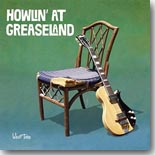 Howlin’ At Greaseland (West Tone Records) is an
impressive ten-track tribute to the great blues
legend, Howlin’ Wolf. As one might surmise from
the album title, this marvelous set was recorded
in San José, California at Kid Andersen’s Greaseland
Studios, rapidly becoming one of the go-to sites
for high quality, award-winning blues albums
over the past few years. Executive producer
Stephanie Tice has assembled a formidable roster
of talent all influenced by the music of the
Wolf, including a couple who played with the
blues icon during his long career. Howlin’ At Greaseland (West Tone Records) is an
impressive ten-track tribute to the great blues
legend, Howlin’ Wolf. As one might surmise from
the album title, this marvelous set was recorded
in San José, California at Kid Andersen’s Greaseland
Studios, rapidly becoming one of the go-to sites
for high quality, award-winning blues albums
over the past few years. Executive producer
Stephanie Tice has assembled a formidable roster
of talent all influenced by the music of the
Wolf, including a couple who played with the
blues icon during his long career.
Piano man Henry Gray appeared on numerous Wolf
recordings during his 12-year stint with the
band, as well as many other Chess Records
classics. He leads the band in a stirring take
on “Worried Life Blues” (with co-lead vocals
from Aki Kumar) and “Little Red Rooster,” backed
by Andersen. Tail Dragger began singing in the
early ’70s under the watchful eye of the Wolf,
who mentored Tail Dragger during the latter days
of his career. Tail Dragger performs “I’m
Leaving You” and “Don’t Trust No Woman,” plus he
shares a couple of short stories about the Wolf.
Other singers appearing include Alabama Mike,
who opens the festivities with a boisterous
“Meet Me in the Bottom,” backed by Rick Estrin’s
enthusiastic harp. Rising star John Blues Boyd
takes the mic for a pair of tunes, “Smokestack
Lightnin’,” “Riding In The Moonlight,” and
“Spoonful” (backed by Estrin with Andersen and
Rockin’ Johnny Burgin on guitar), and shares a
story about seeing Wolf perform in the mid ’50s.
Sax man Terry Hanck also shares a story about
the Wolf, too, in addition to leading the band
in “Howlin’ for My Darling,” and Lee Donald
turns in a rowdy showing on “Forty Four.”
In addition to Andersen, Burgin, Kumar, and
Estrin, several other Greaseland regulars, as
usual, provide stellar support, including Alex
Pettersen (drums), Robby Yamilow (bass), Lorenzo
Farrell (piano), Derrick “D’Mar” Martin (drums),
Jim Pugh (piano), Johnny Cat (guitar), Vance
Ehlers (bass), June Core (drums), Patrick Rynn
(bass), Chris James (guitar), Mike Phillips
(bass), and Joe Kyle, Jr. (bass).
An excellent set of well-performed tunes from an
exciting cast of musicians, Howlin’ At
Greaseland is a wonderful, loving, and overdue
tribute to one of the blues’ finest performers.
--- Graham Clarke
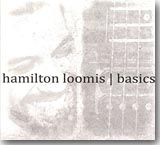 While I have not heard a lot of
Hamilton Loomis’
music, I have heard quite a bit about him over
the years. A Galveston, Texas native who grew in
a house with parents who listened to blues,
rock, and soul music, Loomis became interested
in music at an early age, learning to play
drums, piano, guitar, and harmonica. A protégé
of Bo Diddley, Loomis learned many lessons from
the late Rock & Roll Hall of Famer, and like
Diddley, Loomis’ musical style encompasses not
just the blues, but his other musical
interests of R&B, funk, rock, and soul. While I have not heard a lot of
Hamilton Loomis’
music, I have heard quite a bit about him over
the years. A Galveston, Texas native who grew in
a house with parents who listened to blues,
rock, and soul music, Loomis became interested
in music at an early age, learning to play
drums, piano, guitar, and harmonica. A protégé
of Bo Diddley, Loomis learned many lessons from
the late Rock & Roll Hall of Famer, and like
Diddley, Loomis’ musical style encompasses not
just the blues, but his other musical
interests of R&B, funk, rock, and soul.
In 2011, I reviewed Loomis’ impressive
Live In
England set, so I was pleasantly surprised when
Loomis’ newest release, Basics (Ham-Bone
Records) arrived on my doorstep a few weeks
back. The reason for the album title is pretty
simple, the album is his most personal to date,
focusing on direct, personal, even
autobiographical lyrics with simple melodies and
instrumentation. However, those who appreciate
Loomis’ blend of blues, funk, rock, and soul
will not be disappointed, as those components are
still firmly in place.
On his latest, Loomis sings, plays guitar, bass,
harmonica and keyboards, with backing from
Armando Aussenac (drums/backing vocals), Fabian
Hernandez (sax/backing vocals), Chris Eger
(slide guitar/backing vocals), Bo Jordan Loomis
(maracas), and Sabrina LaField (vocals/bass).
The funky rocking opening track, “Sugar Baby,”
is dedicated to Congenital Hyperinsulinism
International, a group dedicated to fighting
hyperinsulinism (Loomis’ 3-year-old son was
diagnosed with the condition in 2015).
The funk is still on board for the mid-tempo “If
I Would’ve,” where Loomis ponders what might
have been if he’d taken a chance on a
relationship that never happened, while “Candles
and Wine” is a catchy, easy rocker with a touch
of pop mixed in, and “Reason” follows that same
vibe, following a sunny melody and cool
summertime groove. “Ain’t What It Ain’t” is a
sharp blues rocker that features some smoking
slide guitar from Eger, and “Breaking Down” is a
really strong blues ballad that allows Loomis to
showcase his fine vocal talents.
“Looking Into A Dream” has a light, jazzy flair
with Hernandez’s tasty work on saxophone, and on
the touching “Getting So Big,” Loomis reflects
on growing up and now watching his own kids grow
up. “Cloudy Day” has a funky swagger with a
punchy horn section, “Come and Get Me” blends
blues, pop, and R&B seamlessly, and the driving
“Love Can Do” rocks hard. The moving “Prayer” is
directed at families raising children.
Loomis saves the best, and the most fun, for
last. The closer, “Funky Little Brother,” is an
11-minute jam session teaming Loomis with some
of his favorite Houston-area youngsters –
guitarists Alex McKown, Zach Person, and Michael
Bryan-Harris, along with Sarah Kimberly
(keys/trumpet), Reagan Kimberly (drums), Austin
Morris (guitar), and Daniel Holder (bass). James
Brown and Sly Stone would be proud of this
fierce funk workout.
Basics ain’t your Daddy’s blues record, but
Hamilton Loomis’ knack for a catchy lyric, his
incredible musicianship, and his genre-busting
versatility definitely will appeal to a
multitude of music fans.
--- Graham Clarke
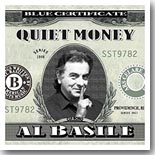 Al Basile was Roomful of Blues’ first trumpet
player when he joined the legendary jump blues
band nearly 45 years ago. Over the past couple
of decades, the singer/songwriter/cornetist has
released over a dozen albums on his own
Sweetspot Record label, and he’s explored
several musical genres during that span, among
them jump blues, urban blues, Texas and Memphis
blues in his own imitable fashion. He’s a fine,
highly original tunesmith, starting out as a
writer and earning the first master’s degree in
Creative Writing at Brown University. Al Basile was Roomful of Blues’ first trumpet
player when he joined the legendary jump blues
band nearly 45 years ago. Over the past couple
of decades, the singer/songwriter/cornetist has
released over a dozen albums on his own
Sweetspot Record label, and he’s explored
several musical genres during that span, among
them jump blues, urban blues, Texas and Memphis
blues in his own imitable fashion. He’s a fine,
highly original tunesmith, starting out as a
writer and earning the first master’s degree in
Creative Writing at Brown University.
Quiet Money is Basile’s latest release on
Sweetspot, and like most of the others he’s
joined by his former Roomful boss, Duke
Robillard, who lends his stellar guitar and
production skills to the project, along with
several other Roomful alum: sax men Doug James
and Rich Lataille, as well as Robillard’s current rhythm
section (Mark Teixeira – drums, Brad Hallen –
bass, Bruce Bears – piano), and trumpeter Jeff
“Doc” Chanonhouse.
Basile kicks off the proceedings with “Blues Got
Blues,” a swinging “State of the Blues” that
laments some of the current trends in the
industry. “Simple Ain’t Easy” has strong ties
with the Lowell Fulson variety of blues, a bit
of Texas and California styles combined., as
Basile notes that sometimes things get too
complicated. “Did You Even Know,” an uptempo
calling out to a habitual liar, is backed by
those wonderful horns, which also feature
prominently in “Wrong To Be Right,” which
addressing taking a few losses to win out in the
end.
The title track ponders why most of the money in
the world ends up in the hands of a few people,
and “Put Some Salt On It” is a West Coast-styled
R&B/blues that will remind listeners of those
classic double-entendre that were so prominent
in the early days of the blues. The powerful
“Line By Line” is a look at an ill-fated love
affair from long ago from a modern, and tragic,
point of view. “I Woulda Been Wrong” is a look
at a lover who really wasn’t, and “True To Form”
is a clever twist on the “Opposites Attract”
theme.
Basile also addresses aging on a couple of
tunes. On “Not Today,” he faces the fact that
time is drawing close, but pleads for more, and
the poignant “Who’s Gonna Close My Eyes” ends
the disc on a somber note.
Roomful of Blues fans will dig
Quiet Money
because Al Basile explores much of the musical
territory that the iconic troupe has mined from
over their 50-year career, but Basile’s
superlative songwriting and the excellent
craftsmanship of these songs will the real draw,
once the music pulls you in.
--- Graham Clarke
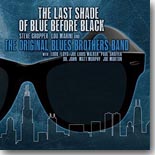 I happened to be watching Saturday Night Live
the night that the Blues Brothers made their big
debut in the spring of 1978. This 14-year-old
John Belushi fan thought they were the coolest
thing ever, but that ten-minute or so skit
quickly evolved into an entertainment
juggernaut, spawning several albums, numerous TV
appearances, and a pair of movies, in addition
to steering a host of music fans (including this
one) onto blues and soul music. I happened to be watching Saturday Night Live
the night that the Blues Brothers made their big
debut in the spring of 1978. This 14-year-old
John Belushi fan thought they were the coolest
thing ever, but that ten-minute or so skit
quickly evolved into an entertainment
juggernaut, spawning several albums, numerous TV
appearances, and a pair of movies, in addition
to steering a host of music fans (including this
one) onto blues and soul music.
Nearly 40 years
later, the Blues Brothers are still making
music, at least the band. Belushi
having departed this mortal coil in 1982.
Guitarist Steve Cropper and sax man Lou Marini
have assembled The Original Blues Brothers Band
and released The Last Shade of Blue Before Black
(Severn Records).
While Cropper and Marini are the lone “original”
band members, they are joined by a formidable,
and star-studded, line-up of musicians who take
up the musical slack nicely, thank you. Veteran
guitarist John Tropea, bassist Eric Udel,
drummer Lee Finkelstein, keyboardists Leon
Pendarvis and Rusty Cloud, a dynamite horn
section featuring Steve Howard (trumpet), Larry
Farrell (trombone), and vocalists Bobby Harden,
Tommy McDonnell, and Rob Paparozzi (the latter
two also play harmonica) successfully recapture
the magic of the original line-up, along with a
number of guest stars and returning alumni.
The 14-song disc features
11 covers of
various blues and soul tunes, including the
opener, a rousing “Baby What You Want Me To Do,”
with Harden, McDonnell, and Paparozzi sharing
vocals. The ensemble vocals also work well on
the chestnut “I Got My Mojo Working,” which also
includes actor Joe Morton (who appeared on Blues
Brothers 2000) behind the mic.
McDonnell ably handles Delbert McClinton’s
“Cherry Street” and shares lead vocals with
another guest, soul legend Eddie Floyd, on
Floyd’s tribute “Don’t Forget About James
Brown.” Floyd sticks around long enough to cover
his own “On A Saturday Night” (co-written by
Cropper) from his Stax days.
Harden does a fine job on “Itch And Scratch,”
done by Rufus Thomas back in the ’60s for Stax,
but absolutely knocks “You Left The Water
Running” (written by Dan Penn, immortalized by
William Bell) out of the park. Paparozzi has a
good time with the Fats Waller oldie “Your
Feet’s Too Big,” and guest/founding member Paul
Shaffer leads a funky run through James Brown’s
“Sex Machine.”
A couple of other familiar voices show up as
well. Joe Louis Walker sings lead on Willie
Dixon’s “Don’t Go No Further” (which also
features a tasty guitar solo from another
founding member, Matt “Guitar” Murphy), and Dr.
John turns in a stylish reading of his own
(co-written with Jessie Hill) “Qualified.” The
originals include Paparozzi’s own “21st Century
Baby,” Cloud’s “Blues In My Feet,” and the title
track, which is written by and sung by Marini.
Other guests include former Blues Brothers Band
members Tom Malone, David Spinozza, Birch
Johnson, and Baron Raymonde., and the album is
dedicated to late members Donald “Duck” Dunn,
Alan “Mr. Fabulous” Rubin, and bassist Udel, who
tragically passed away in September.
As might be expected, the whole set is blues and
soul played well and with tons of enthusiasm and
will be a nice disc to spin at your next party.
It’s the least that we blues fans can do for the
band who steered so many of us to this great
music.
--- Graham Clarke
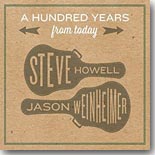 The Texas-born acoustic guitarist
Steve Howell
has been enamored with country blues since, as a
teenager in the mid ’60s, he first heard
Mississippi John Hurt’s happy and gentle fingerpicked guitar work. Over time, he
discovered other blues guitarists, such as Blind
Willie McTell, Robert Johnson, Leadbelly, Son
House, Rev. Gary Davis, and others, later
exploring jazz,pop, country, and rock artists of
the times and combining those styles together
into a style of country blues that sounds
thoroughly modern and traditional at the same
time. The Texas-born acoustic guitarist
Steve Howell
has been enamored with country blues since, as a
teenager in the mid ’60s, he first heard
Mississippi John Hurt’s happy and gentle fingerpicked guitar work. Over time, he
discovered other blues guitarists, such as Blind
Willie McTell, Robert Johnson, Leadbelly, Son
House, Rev. Gary Davis, and others, later
exploring jazz,pop, country, and rock artists of
the times and combining those styles together
into a style of country blues that sounds
thoroughly modern and traditional at the same
time.
Though Howell’s been playing and performing for
many years, he’s only been recording since the
mid 2000s. His sixth album, on the Out of the
Past Music label, is A Hundred Years From Today.
This set features Howell, along with longtime
musical collaborator Jason Weinheimer (bass)
working through a varied set of pre-war blues,
folk, and jazz classics.
Howell opens with a lively read of “Lulu’s Back
In Town,” the jazz standard popularized by Fats
Waller in the mid ’30s, follows with the country
blues “Kansas City Blues,” recorded by Jim
Jackson in 1927, then shifts to Lightnin’
Hopkins’ “Going Back To Florida.” There are also
two songs from Hurt’s repertoire, beginning
with a superb version of the murder ballad
“Louis Collins” and following up with “Got The
Blues, Can’t Be Satisfied.”
On the jazz side, the lovely title track was
originally recorded in the mid ’30s by jazz
singer/trombonist Jack Teagarden, Louis
Armstrong first recorded “Basin Street Blues” in
the late ’20s, and Howell and Weinheimer have a
great time with the medley of “Limehouse Blues”
and “After You’ve Gone.” From there, it’s back
to the blues with Howell’s fun take on Bo
Carter’s risqué “Who’s Been Here?” before the
disc wraps up with a gorgeous cover of Hoagy
Carmichael’s melancholy “Rocking Chair.”
Steve Howell’s albums are always a treat to hear
because of his wonderful playing, his sincere
vocal style, and his dedication to preserving,
recreating, and revitalizing the country blues
for a new generation of blues fans. A Hundred
Years From Today is a great launching pad for
those who enjoy this music.
--- Graham Clarke
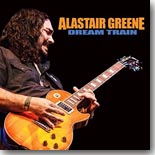 Guitarist
Alastair Greene has earned a spot
among the current crop of revered blues rockers
with his previous releases. Recently, he left
his seven-year tenure as guitarist for rock
legend Alan Parsons to pursue his solo career
full-time and with his latest release, Dream
Train (Rip Cat Records), he takes the plunge
with both feet. Greene combines the best aspects
of the blues, southern rock, jam band, and even
a little bit of old school British rock in his
musical vision. He wrote 12 or the 13 tracks for
his new disc, which was produced by David Z
(Buddy Guy, Gov’t Mule, Jonny Lang, Kenny Wayne
Shepherd). Guitarist
Alastair Greene has earned a spot
among the current crop of revered blues rockers
with his previous releases. Recently, he left
his seven-year tenure as guitarist for rock
legend Alan Parsons to pursue his solo career
full-time and with his latest release, Dream
Train (Rip Cat Records), he takes the plunge
with both feet. Greene combines the best aspects
of the blues, southern rock, jam band, and even
a little bit of old school British rock in his
musical vision. He wrote 12 or the 13 tracks for
his new disc, which was produced by David Z
(Buddy Guy, Gov’t Mule, Jonny Lang, Kenny Wayne
Shepherd).
The title cut gets the disc off to a flashy,
fiery start with a distinct ’70s rocking vibe,
followed by “Big Bad Wolf,” a fast-paced
shuffle. “Nome Zayne” is a previously unreleased
tune from ZZ Top’s Billy Gibbons and it has that
rough-edged boogie blues-rock feel that the
“Little Ol’ Band from Texas” perfected nearly a
half century ago, while “Another Lie” is an
intense blues ballad that features guest
guitarist Walter Trout trading licks with
Greene, and “Song For Rufus” is an excellent
acoustic instrumental. “I’m The Taker” and
“Demons Down” both follow the same cool 70’s
rocker vibe as the title track, and “DareDevil”
is a rugged shuffle that showcases Mike Finnigan
(organ) and Dennis Gruenling (harmonica).
The funky instrumental “Grateful Swagger” finds
guest Debbie Davies duking it out with Greene on
guitar and allows the entire band a few moments
in the spotlight, and Greene shows some
impressive slide guitar chops on the North
Mississippi-styled stomper “Rain Stomp.” The
lovely instrumental “Iowa” adds a touch of jazz
to the mix and there’s some nice interplay here
between Greene and Finnigan. The disc actually
closes on an explosive note with a pair of
outstanding numbers, “Down To Memphis,” which
teams Greene with Mike Zito with electrifying
results, and “Lucky 13,” a smooth uptempo
rocker.
While all the guest stars do a wonderful job,
Greene’s backing crew (Jim Rankin – bass, and
Austin Beede – drums) are a force of nature
themselves, providing rock-solid backing
throughout. Dream Train is a superlative blues
rock album; there’s not a bad song in the
bunch. Alastair Greene sounds like he will
do just fine manning the driver’s seat, thank
you very much.
--- Graham Clarke
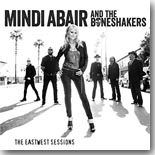 The EastWest Sessions (Pretty Good For A Girl
Records) is the second collaboration between Mindi Abair and The Boneshakers. Abair, a
two-time Grammy nominated saxophonist, singer,
songwriter, got her start in the jazz field,
releasing several well-received solo albums. She
was also the saxophonist on the TV series
American Idol and has made multiple appearances
on TV and motion pictures. After making a move
toward the rock and soul field with her 2015
release, Wild Heart, Abair recruited Boneshakers
founder/guitarist Randy Jacobs into her live
band, and soon both bands joined forces,
culminating in their first joint effort, LIVE in
Seattle, in late 2015. The EastWest Sessions (Pretty Good For A Girl
Records) is the second collaboration between Mindi Abair and The Boneshakers. Abair, a
two-time Grammy nominated saxophonist, singer,
songwriter, got her start in the jazz field,
releasing several well-received solo albums. She
was also the saxophonist on the TV series
American Idol and has made multiple appearances
on TV and motion pictures. After making a move
toward the rock and soul field with her 2015
release, Wild Heart, Abair recruited Boneshakers
founder/guitarist Randy Jacobs into her live
band, and soon both bands joined forces,
culminating in their first joint effort, LIVE in
Seattle, in late 2015.
The new release is the group’s first studio
effort. After 2 ½ years of touring with The
Boneshakers (Jacobs – guitar, Sweet Pea Atkinson
– vocals, Rodney Lee – keyboards, Derek Frank –
bass, Third Richardson - drums), Abair enlisted
Kevin Shirley (Led Zeppelin, Joe Bonamassa,
Aerosmith) to produce the set at the famed
EastWest Studios in Hollywood. The album
features eleven tracks of mostly originals, plus
guest appearances from Bonamassa and rising star
Fantastic Negrito.
Abair’s tough, scrappy vocal is a highlight on
the robust opener, “Vinyl,” and she soars on
saxophone, backed by Jacobs’ rock-edged fretwork
on the boisterous instrumental “Not That Kind of
Girl.” The muscular rock anthem “Play To Win” is
next, and is followed by “Pretty Good For A
Girl,” a slow blues jab at the largely
male-based music world which features
Bonamassa’s blistering guitar work.
Atkinson takes the mic for Sly Stone’s soulful
ballad, “Let Me Hear It From You,” showing his
vocal prowess is every bit as formidable as it
was a quarter century ago when he served as
singer for Was (Not Was), Bonnie Raitt, and Lyle
Lovett. The band tears through “Live My Life,” a
powerhouse track that alternates Abair’s
smoldering sax and Jacob’s incendiary guitar
between verses, then the gospel-flavored
instrumental “Freedom,” before Abair deals
passionate lead vocals on the midtempo life
lesson, “I Had To Learn The Hard Way.”
The aforementioned Negrito sings lead on the
meditative “She Don’t Cry No More,” but Abair’s
sax steals the show on this track, and she
really outdoes herself vocally and
instrumentally on the intense “Done Me Wrong.”
The disc concludes with the acoustic “I Love To
Play The Saxophone,” a sweet tribute from Abair
to her instrument of choice.
It’s always a thrill when artists step out of
their comfort zone and try something different.
Blues fans should be pleased that Mindi Abair
opted to step out of her comfort zone with The
Boneshakers. The EastWest Sessions prove that
this pairing should have great long-term
benefits for them. and for us fans as well.
--- Graham Clarke
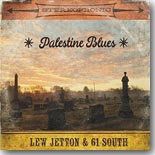 Lew Jetton & 61 South released a strong set of
blues and southern-styled rock last year about
this time (Rain) after an extended absence from
the studio, and the album spent six months on
the RMR Contemporary Blues Chart, finishing #36
for the year. Their follow-up, Palestine Blues
(Coffee Street Records), while following closely
behind its predecessor, is a bit of a change
from its predecessor – a gripping, highly
personal release that focuses on Jettson’s
sometimes turbulent life, covering a ten-year
span where the singer/guitarist battled drugs,
alcohol, depression, joblessness, and a crisis
of faith. Lew Jetton & 61 South released a strong set of
blues and southern-styled rock last year about
this time (Rain) after an extended absence from
the studio, and the album spent six months on
the RMR Contemporary Blues Chart, finishing #36
for the year. Their follow-up, Palestine Blues
(Coffee Street Records), while following closely
behind its predecessor, is a bit of a change
from its predecessor – a gripping, highly
personal release that focuses on Jettson’s
sometimes turbulent life, covering a ten-year
span where the singer/guitarist battled drugs,
alcohol, depression, joblessness, and a crisis
of faith.
Opening with the ominous “Will I Go To Hell,” a
rocker featuring Legendary Shack Shaker J.D.
Wilkes’ torrid harmonica, Jetton goes into full
blues-rock mode with “Oh My My,” before settling
into the soulful R&B of the slower-paced “For
The Pain,” which is highlighted by a splendid
vocal. The mid-tempo rocker “Mexico” is a
highlight, with Jetton lamenting the hard times
that followed after his job moved south of the
border, and “Sold Us Out” is a scathing rebuke
of the Powers That Be.
The poignant “Drinking Again” is a powerful slow
blues with Jetton laying down some T-Bone-esque
guitar work over a smoky after-hours backdrop,
and “Don’t Need No Devil” is a low-key blues
track. The rugged and ominous “Christ Have
Mercy” will remind listeners more than a little
bit of an early ZZ Top track, while “Drama”
another mid-tempo rocker, finds Jetton fed up
and ready for the crises to end. The closer,
“Bout Time,” is a cool shuffle and ends the disc
on a positive note.
The band (Otis Walker – bass, Erik Eicholtz –
drums, Wilkes – harmonica on two tracks)
provides excellent support for Jetton, as on
their previous release, which was quite
different from Palestine Blues (named after the
rural community where Jetton lives). While both
releases are worthwhile, this one exceeds it’s
predecessor due to the strong, personal nature
of the songwriting and the gritty musical
performances. Put this one on your “Must Buy”
list.
--- Graham Clarke
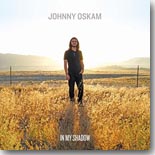 Johnny Oskam is a Southern California
singer/songwriter/guitarist who, like many other
young blues artists, has not only been
influenced by blues greats like Albert King and
Stevie Ray Vaughan, but also rock artists from
Hendrix and Zeppelin to Soundgarden and John
Mayer. He uses this combination of influences to
mold his own distinctive brand of blues. A
standout vocalist and guitarist, he has
attracted an equal amount of attention for his
songwriting skills. He co-produced his recent
sophomore effort, In My Shadow, with his brother
Michael. Johnny Oskam is a Southern California
singer/songwriter/guitarist who, like many other
young blues artists, has not only been
influenced by blues greats like Albert King and
Stevie Ray Vaughan, but also rock artists from
Hendrix and Zeppelin to Soundgarden and John
Mayer. He uses this combination of influences to
mold his own distinctive brand of blues. A
standout vocalist and guitarist, he has
attracted an equal amount of attention for his
songwriting skills. He co-produced his recent
sophomore effort, In My Shadow, with his brother
Michael.
The powerful opener, “Badlands,” is a searing
21st century look at the old Crossroads story,
and Oskam puts his guitar chops on full display
right from the get-go. “Deep In My Bones,” the
following track, ventures into SRV Texas shuffle
mode, and “Turn The Key” reminded me a lot of
one of those classic Bad Company tunes from the
early 70’s. The harmony vocals on this track
are standout and it builds from a sparse
beginning to a thunderous peak and conclusion.
To these ears, the hypnotic “Hold Your Tongue”
evokes the sounds of Mississippi Delta blues,
with a modern touch, while “Waiting For The
Rain” is a rock-edged pop tune with a ’60s
“retro” feel. “Devil’s Comin’” brings to mind
Electric Ladyland-era Hendrix, sort of a second
cousin to “Voodoo Chile,” the original, not the
“Slight Return.”
“Drag You Down” starts out with an urgent
Santana-like “Soul Sacrifice rhythm, before
jumping into a fierce ’90s rock style
reminiscent of Lenny Kravitz, and “I Want You To
Stay” ventures back toward that rock-pop
direction with tight harmony vocals and catchy
lyrics, a potential hit record in a perfect
world. The closer, “Limbo Lane,” follows along
the same line and wraps up the disc in excellent
fashion.
In My Shadow is an outstanding release and shows
that although Johnny Oskam’s musical influences
are numerous, the blues is at the root of
everything he does. This young man, only 25,
could prove to be a serious influence himself in
the future of the music with his triple threat
talents.
--- Graham Clarke
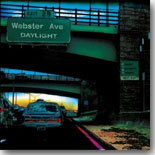 The trio that comprises
Webster Ave sports a set
of pretty impressive resumés. David Webster
(guitars/banjo/lead vocals) has served as an
accompanist to Chuck Berry and Bo Diddley and
worked in New York City as a writer and studio musician
for Bob Dylan, Bette Midler, and others. Andrew Caturano (drums/percussion/vocals) performed on
Broadway as part of Godspell and The Magic Show,
also touring with ’70s pop star Samantha Sang,
accompanying the likes of Diddley, Otis Rush,
and Otis Blackwell, and serving as founding
member of Howard Stern’s band, Pig Vomit. Tony
Mercadante (bass/keys/vocals) was also a
founding member of Pig Vomit and has also
performed with Rush, Blackwell, Ace Frehley, and
many others. The trio that comprises
Webster Ave sports a set
of pretty impressive resumés. David Webster
(guitars/banjo/lead vocals) has served as an
accompanist to Chuck Berry and Bo Diddley and
worked in New York City as a writer and studio musician
for Bob Dylan, Bette Midler, and others. Andrew Caturano (drums/percussion/vocals) performed on
Broadway as part of Godspell and The Magic Show,
also touring with ’70s pop star Samantha Sang,
accompanying the likes of Diddley, Otis Rush,
and Otis Blackwell, and serving as founding
member of Howard Stern’s band, Pig Vomit. Tony
Mercadante (bass/keys/vocals) was also a
founding member of Pig Vomit and has also
performed with Rush, Blackwell, Ace Frehley, and
many others.
Those credential would indicate that the trio
has played a wide variety of musical styles over
their long careers, and that is certainly
verified by the 14 original songs included on
their debut release, Daylight. The opening
track, “This Angry World,” has a southern rock
feel with some tasty guitar work from Webster,
while “Sing Me A Sad Line” sounds like good deep
southern soul. “Ronnie O” is a reggae pop track
(Webster has also worked with several reggae
artists), and “Midnight Sun” has a jazz/pop
layer that is reminiscent of Steely Dan, as does
the title track, a groovy blues shuffle with
airy Fagen/Becker vocal harmonies mixed in.
“Whenever” is a understated jazzy blues with
clarinet accompaniment (courtesy of Joe Meo) and
the pop rocker “Bad Thing” simmers nicely.
“Never Tender Your Goodbyes” is a mellow country
rock ballad and the topical “Ain’t That A Shame”
is funky horn-driven R&B. The acoustic “To Be A
Child” looks at a time when life was much less
complicated, and the upbeat closer, “Just Don’t
Need The Rain,” is an ideal send-off.
The trio gets a helping hand from a talented
group that includes Meo (tenor sax/clarinet/horn
arrangements), Jamie Finegan (trumpet), Benny
Harrison and Matt Detroy (keyboards), and Lissie
Newman (backing vocals). Webster Ave has a
diverse brand of blues that combines jazz, pop,
and country sensibilities at times. The
combination works really well, which makes
Daylight a release that will be enjoyed by fans
of several musical genres.
--- Graham Clarke
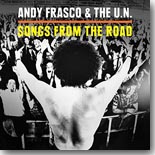 If you’re not familiar with
Andy Frasco & The
U.N., a great place to get familiar would be the
band’s recent CD/DVD from Ruf Records, Songs
From The Road. Frasco got his start in the music
business as a teenaged record label exec and
while touring the U.S. with one of his acts, he
fell in love with the road and decided he could
do that himself, so he learned to sing and play
piano. He assembled a band consisting of
musicians from all over the world and they have
basically toured the world for the past decade,
dropping the occasional studio album in between,
including their most successful release to date,
2016’s Happy Bastards. If you’re not familiar with
Andy Frasco & The
U.N., a great place to get familiar would be the
band’s recent CD/DVD from Ruf Records, Songs
From The Road. Frasco got his start in the music
business as a teenaged record label exec and
while touring the U.S. with one of his acts, he
fell in love with the road and decided he could
do that himself, so he learned to sing and play
piano. He assembled a band consisting of
musicians from all over the world and they have
basically toured the world for the past decade,
dropping the occasional studio album in between,
including their most successful release to date,
2016’s Happy Bastards.
The band is known for their relentless,
energetic, slightly deranged live shows.Ten
years of mostly nonstop touring tends to hone a
band into the proverbial well-oiled machine.
Their repertoire is a mix of rock, funk, soul,
roots, and what the band calls “Party Blues,”
occasionally in the same song. Songs From The
Road is taken from a performance at an outdoor
venue in Bamberg, Germany in front of a very
receptive audience, and features 16 of the
band’s songs on the CD, 15 on the DVD.
The band (Frasco - piano/vocals, Chris Lorentz –
bass, Shawn Eckels – guitar/vocals, Andee Avila
– drums/vocals, Ernie Chang – saxophone, Matt
Owen – tuba, Jelmer Olsman – percussion, Neils
Kant – trumpet, Arno Bakker –
sousaphone/trombone, Rnes Ouburg –
guitar/harp/vocals) is phenomenal and everyone
gets an opportunity to solo frequently, even
switching instruments from time to time, with
some songs stretching well past the ten-minute
mark. Thing is, you won’t notice or care because
it’s a non-stop blast.
However, be forewarned that this is probably not
a selection that you will want to play in front
of the kiddos. This is definitely a “Mature
Audiences” performance, but boy, it’s one that
you won’t forget anytime soon and one that
you’ll be playing after you send them off to
bed. Frasco’s songs, some of the titles of which
can’t really be named here, are wild, but
definitely original, covering traditional blues
themes with no filter attached. He obviously
learned his lessons well because he’s a superb
vocalist and keyboardists.
Good as the CD is by it’s own self, you really
can’t appreciate the greatness of what this
group does without seeing the DVD, which really
gives insight into the band’s energy and
enthusiasm. These guys obviously have a ball
playing together, and you’d be hard-pressed to
find a finer pilot for this runaway train than
Andy Frasco. He bounces from one end of the
stage to the other, on top of the speakers, out
in the audience, with whom he keeps a running
conversation throughout, even getting kids up on
the stage to dance.
By the end of the performance, most listeners
will be exhausted, though it seems like the band
could have gone on even longer. I’m pretty sure
the audience wouldn’t have minded one bit, and
listeners will probably want to hit “replay”
because they may not believe what they’ve just
experienced. You don’t really listen to this
set, you experience it. Andy Frasco & The U.N.
and Songs From The Road is a non-stop party from
start to finish.
--- Graham Clarke
 Canadian singer/songwriter
Rob Lutes recently
released his seventh album, Walk in the Dark
(Lucky Bear Records), a thoroughly enjoyable
journey through the blues, folk, and Americana
genres. Lutes wrote or co-wrote 12 of the 13
tracks on his new release, the lone cover being
a dandy version of John Prine’s “Rocky Mountain
Time,” which is a great fit in his repertoire
because Lutes’ weathered vocal style bears a
resemblance to Prine’s voice at times. Other
times he has a hint of John Hiatt going on as
well, but his voice is distinctively his own,
and is a perfect match for his exceptional
songwriting. Canadian singer/songwriter
Rob Lutes recently
released his seventh album, Walk in the Dark
(Lucky Bear Records), a thoroughly enjoyable
journey through the blues, folk, and Americana
genres. Lutes wrote or co-wrote 12 of the 13
tracks on his new release, the lone cover being
a dandy version of John Prine’s “Rocky Mountain
Time,” which is a great fit in his repertoire
because Lutes’ weathered vocal style bears a
resemblance to Prine’s voice at times. Other
times he has a hint of John Hiatt going on as
well, but his voice is distinctively his own,
and is a perfect match for his exceptional
songwriting.
Standout tracks include the opener, “A Little
Room,” a rhythmic folk-blues track that slowly
builds, “There’s No Way to Tell You that
Tonight,” a slow driving blues set at a James
Cotton performance and is a tribute to the late
harmonica master, and “Pumping Love,” which
rocks like a long-lost Hiatt tune. The subdued
“Whistling Past The Graveyard” is a song that
every songwriter dreams of composing, and
there’s even a nimble-fingered instrumental,
“Spence,” that pays tribute to Bahamian
guitarist Joseph Spence.
“Rabbit” is a fantastic mix of country and
bluegrass, complete with fiddle, mandolin, and
resonator guitar, while the title track mixes
country and rock effectively, as does “Hardest
Thing of All” and the jaunty “Believe In
Something,” which should set toes to tapping.
The bluesy closer, “Better Past,” is a clever
bit of encouragement to look for better things
in the future.
Joining Lutes in his latest endeavor is
guitarist Rob MacDonald (electric, resophonic,
and acoustic guitars), Mark Nelson
(drums/percussion), Andrew Horton (bass), Bob
Stagg (keyboards), Joe Grass (mandolin), Guy
Belanger (harmonica), Josh Zubot (violin), Rob
Fahie (bass), Josephine von Soukkonov and Ian
Kelly (backing vocals).
Walk in the Dark is another fine set of blues,
folk, and Americana from Rob Lutes, a talented
artist who deserves to be heard by a larger
audience.
--- Graham Clarke
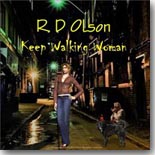 R.D.
Olson hails from Prescott, Arizona and has
twice participated in the International Blues
Challenge, and now has his first self-released
album, Keep Walkin' Woman. As a vocalist,
he's not great but is good enough for the
material on the disc with a little bit of rasp
to his voice, and his harmonica playing isn't
featured as much as I would have expected. R.D.
Olson hails from Prescott, Arizona and has
twice participated in the International Blues
Challenge, and now has his first self-released
album, Keep Walkin' Woman. As a vocalist,
he's not great but is good enough for the
material on the disc with a little bit of rasp
to his voice, and his harmonica playing isn't
featured as much as I would have expected.
The best cuts here are the ones that allow
guitarist Darryl Porras (aka "Big Daddy D") and
pianist Al Williams to turn it loose, such as on
the uptempo blues shuffle "Sheila" and the slow
blues "Petie Reed," the latter an orginal which
Olson says was about a one-time model to whom he
was once engaged. Williams also contributes
solid sax solos to the funky, soulful title cut.
We
finally get to hear a prolonged bit of Olson's
harmonica playing on the Little Walter classic,
"Up The Line," giving us a fine solo that makes
us wish that he played the harp a little more on
this album. Porras comes in with some of his
best guitar licks followed by a killer piano
solo from Williams, making "Up The Line" one the
disc's best cut.
Porras opens the closing number, "Can't Lose
What You Never Had," with intense slide guitar
work, doing his best Muddy Waters imitation on a
song original done by Mr. Morganfield himself,
while Olson again gives us his strongest harp
solo yet along with raw, primal vocals with
plenty of echo.
For
my money, this album takes off towards the end
with a heavier blues focus on the last few cuts.
For more info on R.D. Olson and how to order
Keep Walkin' Woman, check out the website at
www.rdolsonband.com.
--- Bill Mitchell
|